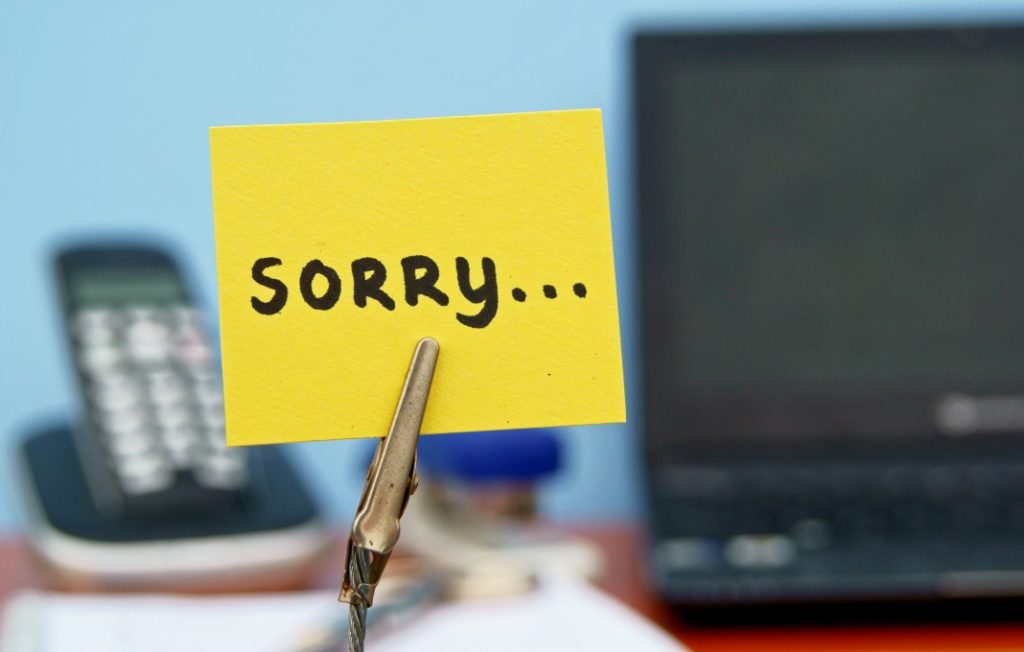 Years ago, while riding my bike, I bumped into a man walking in the opposite direction. At the time, I was living in Germany, but I instinctively blurted out “I’m sorry!” in English. Not sure whether he understood me, I corrected myself with the German version, “Tut mir leid,” which literally translates as, “it causes me suffering.”
Years ago, while riding my bike, I bumped into a man walking in the opposite direction. At the time, I was living in Germany, but I instinctively blurted out “I’m sorry!” in English. Not sure whether he understood me, I corrected myself with the German version, “Tut mir leid,” which literally translates as, “it causes me suffering.”
It causes me suffering. Isn’t that so much more powerful than sorry?
He was probably too far away to hear me at that point, but my first apology was inadequate and meaningless. Not only was it said in the wrong language, but it communicated the wrong sentiment. As leaders, we need to know how to say sorry professionally, using the right verbiage and the right mindset.
This isn’t something you learn in a classroom, on the job or culturally if you’re from the United States or Great Britain. Most Americans and Brits often pepper their speech with the casual “sorry.” A CNBC piece noted that 58% of Americans say they’re sorry when they are trying to do someone a favor but don’t meet the mark—even when it’s not their fault.
This seems innocent, but as a CEO, responses like this are transparently throwaway. Employees and customers know this because it’s a line they use themselves. They expect and deserve authentic, thoughtful apologies when apologies are needed.
Bob was an executive who received some surprising 360-degree feedback. His self-rating was significantly higher than the rating his team members gave him. Upon seeing this, Bob made a surprising admission: “I’ve changed my style significantly over the past three years. The team is rating me as I was several years ago.” One of his colleagues replied, “He’s right. But I’m still angry because he never apologized for the leader he was.”
Why don’t leaders apologize? Bob wanted his team to focus on the future. Yet it was his lack of a sincere apology that kept his team trapped in the past. As a result, his assessment showed a wide disconnect between his team members and himself. This is a common occurrence: Three in 10 employees say their managers don’t foster open, transparent communication (which includes proper apologies), according to SHRM’s 2019 report.
To prevent finding yourself with the same problem, learn how to say sorry professionally. Adopt the following strategies:
1. Own your mistakes. People rarely point out a CEO’s errors. If you know you’re responsible, don’t be dismissive. Saying “I’m sorry you feel that way” or “I’m sorry if that’s the case” shifts the blame off you. Instead, show that you understand why you’re at fault and say, “I apologize.”
2. Use “sorry” appropriately. When you drop “I am…” or turn it into a contraction, you reduce the sincerity and power of your apology. Track the times you say the full phrase and write down what happened. You should see a positive difference as a result of your verbiage and delivery.
3. Determine whether you need to apologize. If you’ve done no harm, don’t use “sorry” as a placeholder for what you really mean to say. For example, if your calendar is backed up, don’t say, “I’m sorry; my capacity is low.” Instead, say “no” succinctly: “We’ll need to reschedule that for later.” Or if someone sends you a reminder, let them know you appreciate it by saying, “Thanks for being on top of that.”
Regularly practice how to apologize without saying “sorry” in business and personal circumstances. You’ll show that you’re a self-assured, poised leader with high emotional intelligence and a low tolerance for trivial, disingenuous rhetoric.

Chief Executive Group exists to improve the performance of U.S. CEOs, senior executives and public-company directors, helping you grow your companies, build your communities and strengthen society. Learn more at chiefexecutivegroup.com.
0

1:00 - 5:00 pm
Over 70% of Executives Surveyed Agree: Many Strategic Planning Efforts Lack Systematic Approach Tips for Enhancing Your Strategic Planning Process
Executives expressed frustration with their current strategic planning process. Issues include:
Steve Rutan and Denise Harrison have put together an afternoon workshop that will provide the tools you need to address these concerns. They have worked with hundreds of executives to develop a systematic approach that will enable your team to make better decisions during strategic planning. Steve and Denise will walk you through exercises for prioritizing your lists and steps that will reset and reinvigorate your process. This will be a hands-on workshop that will enable you to think about your business as you use the tools that are being presented. If you are ready for a Strategic Planning tune-up, select this workshop in your registration form. The additional fee of $695 will be added to your total.

2:00 - 5:00 pm
Female leaders face the same issues all leaders do, but they often face additional challenges too. In this peer session, we will facilitate a discussion of best practices and how to overcome common barriers to help women leaders be more effective within and outside their organizations.
Limited space available.

10:30 - 5:00 pm
General’s Retreat at Hermitage Golf Course
Sponsored by UBS
General’s Retreat, built in 1986 with architect Gary Roger Baird, has been voted the “Best Golf Course in Nashville” and is a “must play” when visiting the Nashville, Tennessee area. With the beautiful setting along the Cumberland River, golfers of all capabilities will thoroughly enjoy the golf, scenery and hospitality.
The golf outing fee includes transportation to and from the hotel, greens/cart fees, use of practice facilities, and boxed lunch. The bus will leave the hotel at 10:30 am for a noon shotgun start and return to the hotel after the cocktail reception following the completion of the round.